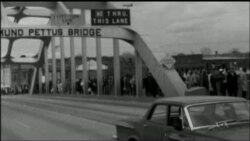U.S. President Barack Obama and thousands of people will gather in the small southern U.S. city of Selma, Alabama, Saturday, March 7 to commemorate the 50th anniversary of a historic voting rights march that became known as “Bloody Sunday."
Hundreds of African American demonstrators marched for voting rights in Selma, Alabama, 50 years ago.
As they crossed the Edmund Pettus bridge, they were attacked by state police officers.
The violent images outraged the nation, drawing national attention to the denial of voting rights for millions of African Americans.
“I had to go to the courthouse, stand in line, and vote," said civil rights activist Nims Gay.
Fifty years later, Gay returned to the Birmingham courthouse where he and other blacks had questioned white county officials who rejected their constitutional right to vote.
“Why do you think you are superior to me? Do you not realize from one blood all nations flow? Or is that something you do not understand? And that would irritate them. But I did not worry about irritating anybody. When you are right, you are right. When you are wrong, you are wrong," said Gay.
Following legal challenges blacks were allowed to vote. He says the fight was hard, but worth it.
“A voteless people are a hopeless people. The same thing goes today. I do not care if you are black, white, green or gray, if you cannot vote you are messing up," he said.
Retired teacher Jeanne Smiley was among the first African Americans allowed to vote in Montgomery, Alabama.
“A lot of people around Montgomery and surrounding areas, so many of them were really afraid to go and try to vote. But those of us that were able to vote, tried to vote and we tried to encourage others to go and vote," said Smiley.
“If you had a job just trying to register to vote was enough to get you fired. In addition to that they would even fire some of your relatives," said Alabama State Senator Hank Sanders.
Days after “Bloody Sunday” Hank Sanders joined civil rights leader Martin Luther King and thousands of others in a march to Alabama’s capital, Montgomery.
“The power of the vote seemed so powerful to those who had it . They did not want anybody else to have it and they were doing everything they could, they were using every mechanism at their disposal to stop the [black] vote," he said.
"The accomplishments that we made did not occur by themselves," said Civil rights lawyer Fred Gray.
Gray, who represented King, won a court ruling that allowed people to march from Selma to Montgomery.
"It is all of us who must overcome the crippling legacy of bigotry and injustice," said President Lyndon Johnson.
Gray says less than five months later President Lyndon Johnson signed the 1965 Voting Rights Act into law.
“The voting rights was a key, because it opened the door for so many other things. Because if you get people to vote then you can elect individuals to office and these individuals who were elected to office held the power to appoint hundreds of other people to elected office," said Gray.
Back in Birmingham, Nims Gay sings the civil rights anthem that inspired him and so many others in their struggle.





